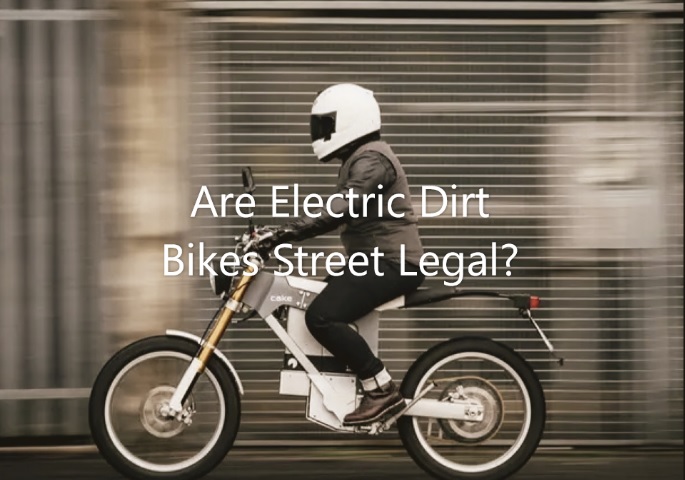Are Electric Dirt Bikes Street Legal?

In the world of two-wheel transportation, the advent of electric dirt bikes has spurred a new wave of excitement among bike enthusiasts. Offering adrenaline-pumping off-road experiences while minimizing noise and air pollution, electric dirt bikes are an increasingly popular choice. However, the question arises: Are electric dirt bikes street legal? This article seeks to answer this question by examining the characteristics of electric dirt bikes and their standing in relation to road use laws.
Understanding Electric Dirt Bikes
Electric dirt bikes, much like their fuel-powered counterparts, are designed for off-road usage. They are built to handle rough terrain, jumps, and high-speed riding over unpaved surfaces. The defining feature of an electric dirt bike is its power source – instead of an internal combustion engine, it uses an electric motor powered by a rechargeable battery.
Electric Dirt Bikes and Road Legality
The answer to whether electric dirt bikes are street legal isn’t a straightforward yes or no. It largely depends on the specific features of the bike and the local laws of the area where it’s being used.
In most jurisdictions, a vehicle’s road legality is determined by its adherence to safety and emission regulations. Since electric dirt bikes produce zero emissions, they inherently comply with emission standards. However, the sticking point lies with the safety standards.
Many electric dirt bikes lack essential components required for street-legal vehicles, such as headlights, brake lights, indicators, mirrors, and horns. They also often don’t have necessary documentation like a Vehicle Identification Number (VIN). Consequently, while they might be perfectly suited to off-road environments, they aren’t automatically legal for use on public roads.
The Legalities of Electric Dirt Bikes in Different Jurisdictions
As previously mentioned, the legality of electric dirt bikes on the streets varies from one jurisdiction to another. Let’s explore this concept in greater depth, focusing on a few major regions.
United States
In the United States, state laws significantly vary when it comes to determining the legality of electric dirt bikes. Some states are more lenient and have processes in place that allow for off-road vehicles to be converted to street-legal machines. States like Arizona, for instance, are known to be particularly accommodating in this respect.
However, other states like California have stringent regulations. They demand adherence to a multitude of safety and equipment standards, and in some cases, it’s simply not possible to convert an off-road vehicle for street use due to emissions regulations, even though electric dirt bikes produce zero emissions. It’s therefore crucial to check specific state regulations before embarking on the process of conversion.
United Kingdom
In the United Kingdom, the process of making an electric dirt bike street-legal is also quite involved. There is a well-defined procedure for registering and using formerly off-road vehicles on public roads, governed by the Driver and Vehicle Licensing Agency (DVLA).
To make an electric dirt bike street-legal in the UK, it must first meet the road vehicle lighting regulations, which means it must have specific lights and reflectors installed. It also has to comply with the Road Vehicles (Construction and Use) Regulations 1986, which set out the necessary specifications for brakes, mirrors, tires, and horns, among other things.
Moreover, the bike must pass the Individual Vehicle Approval (IVA) test, a pre-registration inspection for vehicles that have not been type-approved to UK or European standards. This rigorous test ensures the vehicle is designed and constructed to meet essential environmental and safety standards.
After passing the IVA, you can then register the bike with the DVLA, which involves providing details about the vehicle, proof of newness (if applicable), and proof of type approval. Once registered, you will receive a registration certificate and can obtain a number plate. Keep in mind that you also need to have appropriate insurance in place before you can legally ride on public roads.
As with the other regions, it’s clear that making an electric dirt bike street-legal in the UK involves a significant commitment in terms of time, effort, and money. It’s important to consider these factors when deciding whether to convert an off-road electric bike for street use or to opt for a machine that’s already designed and approved for road use.
European Union
In the European Union, rules can also vary between countries, but the process of making an electric dirt bike street legal is generally quite complex. For an off-road vehicle to be used on public roads, it must comply with the European Whole Vehicle Type-Approval system or the national type-approval of the country where it’s being used, which means meeting numerous safety, environmental, and administrative requirements. Also, it needs to pass a comprehensive inspection after modifications.
Australia
In Australia, each state and territory has its own vehicle standards and regulations. For example, in New South Wales, off-road motorcycles must comply with Australian Design Rules (ADR) and pass an inspection by an Authorised Unregistered Vehicle Inspection Station (AUVIS) to be deemed roadworthy. The process can be complicated and costly, so riders often opt for dual-sport motorcycles that are street-legal from the outset.
Making Electric Dirt Bikes Street Legal in General
It’s possible to modify electric dirt bikes to make them street legal, but the process can be complex and varies depending on local laws. Generally, this involves adding necessary components to comply with safety standards and obtaining the right documentation. Here’s a simplified process:
- Adding Necessary Components: Install essential equipment like headlights, brake lights, turn signals, mirrors, speedometer, and a horn. The bike should also have DOT-approved tires for street use.
- Inspection: After making the modifications, the bike may need to be inspected by a designated authority to confirm it meets all the requirements for a street-legal vehicle.
- Registration: If the bike passes inspection, the next step is to register it for road use. This process usually involves providing proof of ownership, proof of insurance, and payment of a registration fee.
- Title and License Plate: Once registered, the owner can obtain a title and license plate for the bike.
Remember, this process and the specific requirements may vary based on local laws, so it’s important to check with local transportation or motor vehicle agencies before starting the conversion process.
Final Thoughts
While electric dirt bikes offer thrilling off-road experiences, their street legality is not guaranteed and often requires significant modifications and paperwork. Before buying an electric dirt bike with the intent to use it on public roads, consider the feasibility and cost of making it street legal in your area. Alternatively, consider electric motorcycles or e-bikes designed for street use from the outset. These are typically equipped with all the necessary components and documentation for road legality, providing a hassle-free solution for eco-friendly urban commuting.
